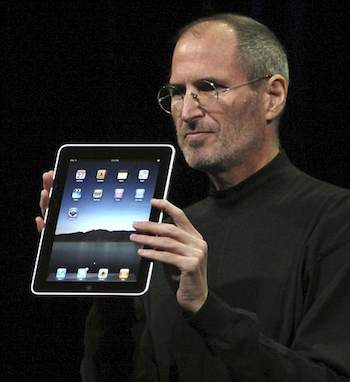- MENU
- HOME
- SEARCH
- WORLD
- MAIN
- AFRICA
- ASIA
- BALKANS
- EUROPE
- LATIN AMERICA
- MIDDLE EAST
- United Kingdom
- United States
- Argentina
- Australia
- Austria
- Benelux
- Brazil
- Canada
- China
- France
- Germany
- Greece
- Hungary
- India
- Indonesia
- Ireland
- Israel
- Italy
- Japan
- Korea
- Mexico
- New Zealand
- Pakistan
- Philippines
- Poland
- Russia
- South Africa
- Spain
- Taiwan
- Turkey
- USA
- BUSINESS
- WEALTH
- STOCKS
- TECH
- HEALTH
- LIFESTYLE
- ENTERTAINMENT
- SPORTS
- RSS
- iHaveNet.com
David LaGesse

Few revelations from Apple have generated more anticipation than the company's product announcement scheduled for Wednesday. Though nobody knows exactly what it will be, reports widely agree that the device will be a new type of portable computer akin to a tablet. That is, it will have no hardware keyboard, and it be slimmer than most laptops. But it will be bigger than a smartphone with a screen somewhere between 7 and 10 inches wide.
If the reports are accurate, Apple has taken on perhaps the toughest challenge in portable computing. Tablet PCs have failed for nearly a decade to catch on with consumers or businesses. Granted, tablets so far have mostly run Windows, and a particularly awkward version at that. Apple, meanwhile, has shown it can work miracles with slick software, new services, and marketing. The company has used all three to beat competitors in music players and smartphones.
But despite the magic, some Apple products have flopped and a few are currently floundering, including the Apple TV and the MacBook Air.
A tablet presents particularly big obstacles for Apple. Here are five that could very likely sink the company's new play:
Too big.
A tablet PC is meant by design to be portable. But anything bigger than a smartphone is too big for a pocket or for hanging on a belt, which quickly limits who wants to carry one. Apple may be thinking more along the lines of a luggable device that's designed for use around the house. Some have suggested it will be passed among home users who want to quickly deal with E-mail, glance at family photos stored online, or stream a quick video. But videos and pics can be had now on TVs with Internet connections either built in or added with cheap external boxes. E-mail is more efficient with a cheaper netbook.
Too small.
A 7-inch screen might be OK for looking at pictures, watching short videos, or even reading (Amazon proved 6 inches is sufficient for reading). But the Apple tablet will need to do more to justify its price. Even a 10-inch screen isn't enough for many tasks, such as Web surfing. Netbooks, for example, are morphing into something called "ultrathins," which have larger screen sizes--12 to 13 inches versus a netbook's 10 inches or smaller. The littler screens are more portable but are too tiring for lengthy Web surfing or other PC-like tasks.
Too hungry.
Apple can work miracles with software, services, and marketing. But even CEO Steve Jobs can't change chemistry, which has kept battery life from meeting ever growing demands. A thin tablet has only so much room for a battery. Yet from widespread reports, the device will display photos and videos that require a battery-draining color screen. Layer on wireless support--particularly the WiFi that will be necessary for video streaming--and any practical and safe battery is good for hours at most.
Too pricey.
Reports have put the price between
Too clumsy.
From all reports, the Apple tablet will not have a hardware keyboard and will depend on its touch-sensitive screen. That would jibe with the iPhone, which relies on a software keyboard that, while good for what it is, is too awkward for lengthy and easy typing. The hardware keyboard is important to the popularity of BlackBerry phones. Messaging requires too much typing to rely on a software keyboard, and even Web surfing is much easier with hard keys for typing and shortcuts.
Texas College Newspaper Will Be First to Publish on iPad
I'm not entirely sure which topic got more buzz: the introduction of Apple's iPad or President Obama's State of the Union address. Either way, it was pretty clear which one's buzz will last longer: the iPad. Everyone's talking about the tablet computer designed to compete with the Kindle.
Abilene Christian University 's student newspaper, the Optimist, hoping to capitalize on the buzz, will be the first student publication to publish using the iPad, the Optimistreports. The gadget will be available in 60 days, and a team of faculty and student researchers is planning for the Optimist to be ready by then. The Optimist wants to expand its reach on campus, where it already publishes a print and an online product in addition to making content available via an iPhone application.
"This is yet another opportunity for our students to make use of a cutting-edge delivery system -- the third version of mobile media delivery we have pioneered," Cheryl Bacon, chair of Abilene Christian's Department of Journalism and Mass Communication, said in a release.
"We pay close attention to the way young people consume news," Kenneth Pybus, faculty adviser of the Optimist, said in the same release. "They tend to use all the tools at their disposal to get information. With the iPad, we foresee the potential for an explosion in news consumption."